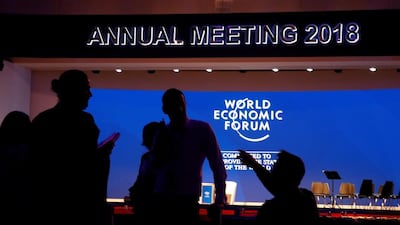The 2018 World Economic Forum concluded on Friday with a highly anticipated speech by Donald Trump, who became the first US president in 18 years to address the annual summit of the world's business and political leaders. The man who, as a candidate, had portrayed himself as the nemesis of the "false song of globalism" morphed into a pragmatist in Switzerland. Mr Trump did not altogether abandon his nationalism, but he did temper it with the assurance that "America first does not mean America alone". Propelled into office with the backing of isolationists, Mr Trump deployed his speech to affirm the indispensability of the "international trading system", solicit investment in the US, and call for international unity to prevent Iran from acquiring nuclear weapons and to "de-nuke" the Korean peninsula.
Mr Trump's speech at Davos to some extent reflected the contradictions of his presidency so far – some sensible ideas braided together with impulsive decision-making, cultural insularity and exclusionary nationalism. The gains he stands to make from pursuing disarmament of the Iranian regime are undermined by his threats to Palestinians, which, in addition to being morally indefensible, inflame tensions across the Arab and Muslim worlds. Similarly, the pro-business climate he has fostered with his tax cuts is undermined by his nationalist rhetoric.
_______________
Read more
Davos 2018: Modi's speech leaves global leadership vacuum unfilled
Davos 2018: People like Trump are 'disappointing', says Malala Yousafzai
Davos 2018 diary: Embracing disruption
_______________
These contradictions are of course inseparable from the larger fractures of the world, which were reflected in the way the Davos summit unfolded this year. Indian prime minister Narendra Modi and his Canadian counterpart, Justin Trudeau, mounted powerful defences of globalisation, making a pre-emptive case for international cooperation in the days preceding Mr Trump's speech. Malala Yousafzai, the young Pakistani Nobel prizewinner, argued eloquently for gender equality. "In order to be a man," she said, "you have to recognise that all women and all those around you have equal rights." This message would be valid at any time – but it carries a special significance in 2018.
Moving beyond politics, participants at Davos grappled with the formidable challenges of what WEF chairman Klaus Schwab has called the "fourth industrial revolution". Technological innovation – primarily the rise of artificial intelligence – is the challenge of our time. Together with intensifying economic disparity, they hold the key to progress in the 21st century. An Inclusive Development Index (IDI) devised by WEF presents a rounded picture by taking into account such factors as poverty, life expectancy and public debt – and thus enables governments to tailor their policies with greater exactitude. The index is in use in 103 countries but if the increasing gulf between the rich and poor in a period marked by economic growth is to to be arrested, then it needs to spread further. The rapidity of the change we are undergoing calls for careful policymaking at the national level and concerted cooperation on the international stage. But the ideas that emerged at Davos this year will amount to nothing if governments across the world do not undertake the hard work of putting them into practice.
Follow The National's Opinion section on Twitter

